Related Research Articles
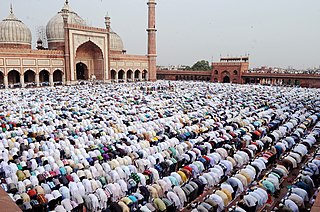
Freedom of religion or religious liberty is a principle that supports the freedom of an individual or community, in public or private, to manifest religion or belief in teaching, practice, worship, and observance. It also includes the freedom to change one's religion or beliefs, "the right not to profess any religion or belief", or "not to practise a religion".
The world's principal religions and spiritual traditions may be classified into a small number of major groups, though this is not a uniform practice. This theory began in the 18th century with the goal of recognizing the relative levels of civility in different societies, but this practice has since fallen into disrepute in many contemporary cultures.
Religion in Africa is multifaceted and has been a major influence on art, culture and philosophy. Today, the continent's various populations and individuals are mostly adherents of Christianity, Islam, and to a lesser extent several traditional African religions. In Christian or Islamic communities, religious beliefs are also sometimes characterized with syncretism with the beliefs and practices of traditional religions.

The Catholic Church is "the Catholic Communion of Churches, both Roman and Eastern, or Oriental, that are in full communion with the Bishop of Rome ." The church is also known by members as the People of God, the Body of Christ, the "Temple of the Holy Spirit", among other names. According to Vatican II's Gaudium et spes, the "church has but one sole purpose–that the kingdom of God may come and the salvation of the human race may be accomplished."
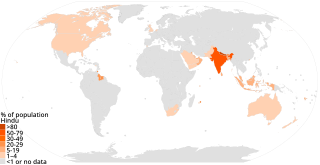
Hinduism has approximately 1.2 billion adherents worldwide. Hinduism is the third largest religion in the world behind Christianity (31.5%) and Islam (23.3%).
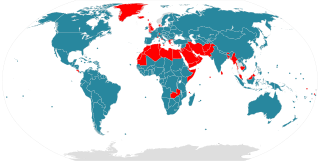
A secular state is an idea pertaining to secularity, whereby a state is or purports to be officially neutral in matters of religion, supporting neither religion nor irreligion. A secular state claims to treat all its citizens equally regardless of religion, and claims to avoid preferential treatment for a citizen based on their religious beliefs, affiliation or lack of either over those with other profiles.
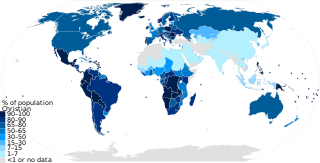
As of the year 2020, Christianity had approximately 2.4 billion adherents and is the largest-religion by population respectively. According to a PEW estimation in 2020, Christians made up to 2.4 billion of the worldwide population of about 8 billion people. It represents nearly one-third of the world's population and is the largest religion in the world, with the three largest groups of Christians being the Catholic Church, Protestantism, and the Eastern Orthodox Church. The largest Christian denomination is the Catholic Church, with 1.3 billion baptized members. The second largest Christian branch is either Protestantism, or the Eastern Orthodox Church.

Islam is a minority religion in Botswana, a country dominated by Christians. Islam came to the country through Muslim immigrants from South Asia, who settled in the area during the British colonial rule. According to the 2001 census, there are around 5,000 Muslims in Botswana, which is less than 1 percent of the population. The relations between the different religious groups remain peaceful and friendly despite rising inter-religious tensions in the other parts of Africa.

More than 70% of the population of Botswana is Christian. Most are members of the Anglican, United Congregational Church of Southern Africa, the Methodist Church of Southern Africa, and African independent churches. Anglicans are part of the Church of the Province of Central Africa. The Roman Catholic Church includes about 5% of the nation's population.
Growth of religion involves the spread of individual religions and the increase in the numbers of religious adherents around the world. In sociology, desecularization is the proliferation or growth of religion, most commonly after a period of previous secularization. Statistics commonly measure the absolute number of adherents, the percentage of the absolute growth per-year, and the growth of converts in the world.
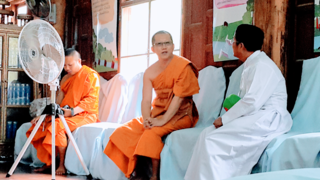
The status of religious freedom around the world varies from country to country. States can differ based on whether or not they guarantee equal treatment under law for followers of different religions, whether they establish a state religion, the extent to which religious organizations operating within the country are policed, and the extent to which religious law is used as a basis for the country's legal code.

Botswana is a Christian majority nation. However, the country is officially secular and allows freedom of religious practice.
Of the religions in Tunisia, Islam is the most prevalent. It is estimated that approximately 99% of Tunisia's inhabitants identify themselves as Muslims.

Christianity is the predominant religion in Solomon Islands, with Anglicanism being the single largest denomination.

Christian population growth is the population growth of the global Christian community. According to a 2011 Pew Research Center survey, there were more than 2.2 billion Christians around the world in 2010, more than three times as many as the 600 million recorded in 1910. However, this rate of growth is slower than the overall population growth over the same time period. In 2020, Pew estimated the number of Christians worldwide to be around 2.38 billion. According to various scholars and sources, high birth rates and conversions in the Global South were cited as the reasons for the Christian population growth.

Christianity is the most widely professed religion in South Sudan, with significant minorities of the adherents of traditional faiths and Islam.

Religion in Togo is diverse, with Christianity being the most widely professed faith. A substantial number of the Togolese also practice traditional faiths and Islam.
The religion in Liechtenstein is predominantly Catholic, with a minority of Protestants, non-adherents, and adherents of other religions. Liechtenstein has a small Muslim population, composed mainly of immigrants from countries like Bosnia and Herzegovina, Serbia, and Turkey.

Adherents of Islam constitute the world's second largest religious group. A projection by the PEW suggests that Muslims numbered approximately 1.9 billion followers in 2020. Studies in the 21st century suggest that, in terms of percentage and worldwide spread, Islam is the fastest-growing major religion in the world, mostly because Muslims have more children than other major religious groups. Most Muslims are either of two denominations: Sunni or Shia. Islam is the majority religion in several subregions: Central Asia, West Asia, North Africa, West Africa, the Sahel, and the Middle East. The diverse Asia-Pacific region contains the highest number of Muslims in the world, easily surpassing the combined Middle East and North Africa.
The status of religious freedom in Africa varies from country to country. States can differ based on whether or not they guarantee equal treatment under law for followers of different religions, whether they establish a state religion, the extent to which religious organizations operating within the country are policed, and the extent to which religious law is used as a basis for the country's legal code.
References
- ↑ Igwe, Leo. "Atheism In Botswana" . Retrieved 12 July 2017.
- ↑ International Religious Freedom Report 2007: Botswana. United States Bureau of Democracy, Human Rights and Labor (September 14, 2007). This article incorporates text from this source, which is in the public domain.
- ↑ "BOTSWANA 2012 INTERNATIONAL RELIGIOUS FREEDOM REPORT" (PDF). State Department . Retrieved 16 September 2013.
- ↑ Müller, Hans-Peter; Muller, Hans; Mekgwe, Pinkie; Mhloyi, Marvellous Mynard (12 July 2017). Values and Development in Southern Africa. African Books Collective. ISBN 9782869785540 . Retrieved 12 July 2017– via Google Books.